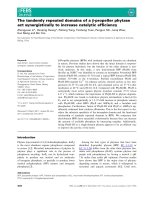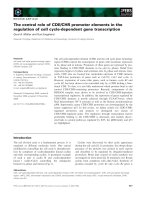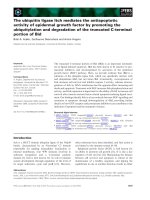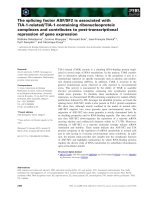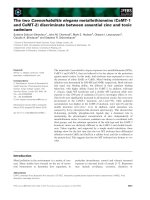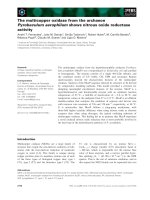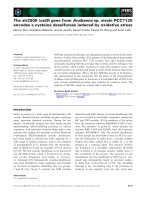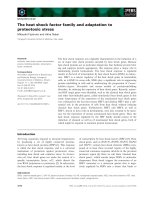Tài liệu Báo cáo khoa học: "THE DICTIONARY SERVER " doc
Bạn đang xem bản rút gọn của tài liệu. Xem và tải ngay bản đầy đủ của tài liệu tại đây (86.94 KB, 1 trang )
THE DICTIONARY SERVER
Martin Kay
Intelligent Systems Laboratory
Xerox Palo Alto Research Center
3333 Coyote Hill Road
Pain Alto, California 94304~ USA
The term "machine-readable dictionary" can clearly be taken
in two ways. In its stronger and better established
interpretation, it presumably refers to dictionaries intended for
machine consumption and use as in a language processing
system of some sort. In a somewhat weaker sense, it has to do
with dictionaries intended for human consumption, but through
the intermediary of a machine. Ideally, of course, the two
enterprises would be conflated, material from a single basic
store of lexical information being furnished to different clients
in different forms. Such a conflation would, if it could be
accomplished, be beneficial to all parties. Certainly human
users could surely benefit from some of the processes that the
machine-oriented information in a machine-readable dictionary
usually makes available. They can profit even more from other
processes specifically oriented to the human user but which
have not yet received much attention. For the~e reasons, 1
believe that machine-readable dictionaries should, and probably
soon will, come to replace traditional book-form dictionaries
fairly soon. 1 do not have in mind machine-readable
dict~ionaries that single users load into their personal machines
so much as centralized services to which individual clients
subscribe.
I have spend a considerable proportion of the last two years
designing and implementing a "dictionary server." This is a
computer with a large dictionary in its file system, specifically
the American
Heritage Dictionary
(for the use of which we
are indebted to its publisher, Houghton-Mifflin Company),
together with a variety for indices for giving rapid access to it.
The machine is connected thorugh a packet-switching network
to a large number of other computers and work stations.
Through a mechanism known as "remote procedure call"
(RPC), developed concurrently with the dictionary server, a
program running on any of these other machines can execute
one of a number of procedures "exported" by the server,
causing the corresponding procedure to be executed in the
server and the result returned to the client as though it had all
happened in the same machine. The client reaps several
benefits from this mode of operation. First, he does not have to
provide storage for this very considerable body of data, nor the
time necessary to operate on it. Second, by consigning its care
to others, he can profit from regular maintenance and
improvements resulting from experience with a large
community of users. Less obvious, though perhaps more
important than these advantages, is the fact that he can hope
to profit from the sophisticated and specialized processing
methods available at the central location.
The server I have built represents only a few steps towards
the one that would provide the richness of service I can easily
imagine. Among its present capabilities are the following: a
client can discover if a sequence of letters constitutes a word
recognized by the dictionary even though it is presented in an
inflectional variant not actually stored in the dictionary. The
methods used to accomplished this have sound theoretical bases
and generalize across a wide range of language types so that
languages with much richer morphological structures than
English are provided for. A client can consult the dictionary
for the spelling of a word by presenting it with candidate
spellings. The server is able to locate entries that could be
pronounced in the same way, or ways, as the candidate. It
presents these to the client in order of decreasing similarity to
the candidate. If the client has difficulty recognizing the
appropriate one, he can have the associated definitions
presented to him. Definitions, etymologies, synonyms, and so
forth can be obtained in a variety of ways. The server
undertakes the most onerous procedures that must be carried
out by a spelling correction program, namely those that relate
putatively misspelled words to actual words into which they can
be transformed as a result of the kinds of error commonly made
by typists.
These facilities are relatively easy to provide, using as the
data base, a machine readable version of a standard dictionary.
A dictionary designed specifically for use through a dictionary
server could do a great deal more. For example it could present
a client with several different perspectives on a semantic field
so as to provide a means of finding "le mot jnste," that is on
the tip of the writer's tongue. This is the function that Roget
designed his thesaurus to fill and 1 believe it is such a device as
the dictionary server that will provide the first possibility of
doing better than he. What stands in the way of dictionary
services of far greater utility than even the largest currently
available books is not technological inadequacies, or even
shortcomings of linguistic or lexicological theory, so much as the
courage and foresight to invest in lexicographic data bases of
radical design.
461
